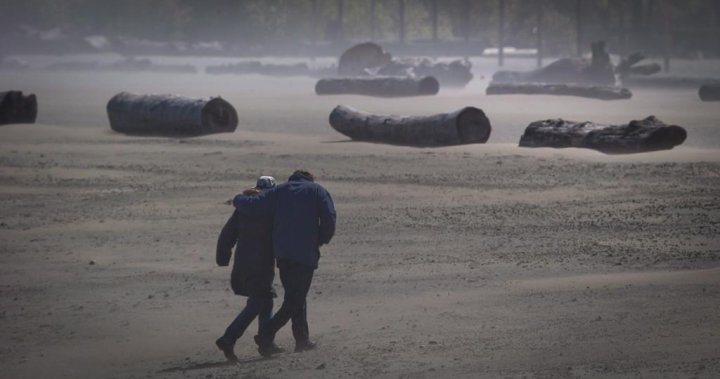British Columbia’s coastal regions are once again bracing for the impact of high winds, with gusts exceeding 100 km/h reported on several outlying islands. This latest bout of stormy weather follows a devastating windstorm last weekend that triggered a fatal mudslide in the Sea to Sky region. The ongoing severe weather conditions underscore the vulnerability of the province’s coastal communities to powerful wind events. The recurring nature of these storms raises concerns about the long-term impacts on infrastructure, transportation, and the safety of residents in affected areas.
Environment Canada has issued wind warnings for a significant portion of B.C.’s coastline, including Haida Gwaii, northern and eastern Vancouver Island, and parts of the Sunshine Coast. These warnings highlight the potential for winds to reach speeds of up to 120 km/h, creating hazardous driving conditions and posing risks to maritime activities. The intensity of the winds prompted BC Ferries to cancel several sailings in Haida Gwaii and the Campbell River area, disrupting travel plans for many. While some ferry services have resumed as conditions improved, the ongoing threat of high winds continues to impact coastal transportation.
Data from Environment Canada reveals the extent of the wind’s ferocity, with gusts reaching 140 km/h or more recorded at Sartine and Solander islands, located off the northern coast of Vancouver Island. Other locations, including Sandspit and Masset in Haida Gwaii, experienced gusts of 90 km/h or higher. These extreme wind speeds highlight the potential for damage to property and infrastructure, as well as the risk of power outages and disruptions to daily life in affected communities.
The current wind warnings follow a series of powerful wind events that have battered B.C.’s coast in recent days. On Saturday, winds exceeding 120 km/h pummeled the central coast, while gusts over 90 km/h were reported in Bella Bella and the Howe Sound north of Metro Vancouver. Earlier in the week, winds approaching 140 km/h were recorded on Vancouver Island, further demonstrating the intensity and frequency of these weather systems.
The tragic consequences of last weekend’s windstorm continue to unfold, as emergency crews recovered the body of the second victim of a mudslide in the Sea to Sky region. The mudslide, triggered by the severe weather, struck a home, burying two occupants. The body of the first victim was recovered on December 15th, the day after the mudslide. Squamish RCMP confirmed the recovery of the second victim’s body on Saturday night, marking a somber conclusion to the search efforts. The identities of the victims have not been released.
The repeated occurrences of high winds and the resulting impacts on B.C.’s coastal communities underscore the need for preparedness and resilience in the face of these increasingly frequent weather events. As climate change continues to influence weather patterns, the province must invest in infrastructure improvements, early warning systems, and community education programs to mitigate the risks associated with extreme wind events. The tragic loss of life in the Sea to Sky mudslide serves as a stark reminder of the devastating consequences that can occur when severe weather strikes.

